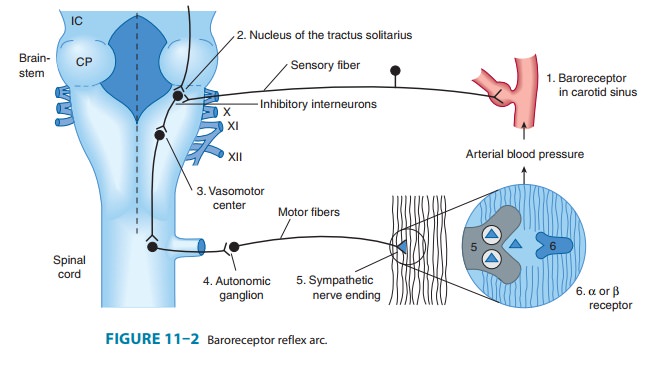Chapter: Basic & Clinical Pharmacology : Antihypertensive Agents
Drugs That Alter Sympathetic Nervous System Function
DRUGS THAT ALTER SYMPATHETIC
NERVOUS SYSTEM FUNCTION
In
many patients, hypertension is initiated and sustained at least in part by
sympathetic neural activation. In patients with moderate to severe hypertension,
most effective drug regimens include an agent that inhibits function of the
sympathetic nervous system. Drugs in this group are classified according to the
site at which they impair the sympathetic reflex arc (Figure 11–2). This
neuro-anatomic classification explains prominent differences in cardiovas-cular
effects of drugs and allows the clinician to predict interactions of these
drugs with one another and with other drugs.The subclasses of sympathoplegic
drugs exhibit different pat-terns of potential toxicity. Drugs that lower blood
pressure by actions on the central nervous system tend to cause sedation and
mental depression and may produce disturbances of sleep, includ-ing nightmares.
Drugs that act by inhibiting transmission throughautonomic ganglia (ganglion
blockers) produce toxicity from inhibition of parasympathetic regulation, in
addition to profound sympathetic blockade and are no longer used. Drugs that
act chiefly by reducing release of norepinephrine from sympathetic nerve
endings cause effects that are similar to those of surgical sympathectomy,
including inhibition of ejaculation, and hypoten-sion that is increased by
upright posture and after exercise. Drugs that block postsynaptic adrenoceptors
produce a more selective spectrum of effects depending on the class of receptor
to which they bind. Although not discussed, it should be noted that renal
sympathetic denervation is effective in lowering blood pressure in patients
with hypertension resistant to antihyper-tensive drugs.

Finally,
one should note that all of the
agents that lower blood pressure by altering sympathetic function can elicit
compensatory effects through mechanisms that are not dependent on adrenergic
nerves. Thus, the antihypertensive effect of any of these agents used alone may
be limited by retention of sodium by the kidney and expansion of blood volume.
For this reason, sympathoplegic antihypertensive drugs are most effective when
used concomi-tantly with a diuretic
Related Topics